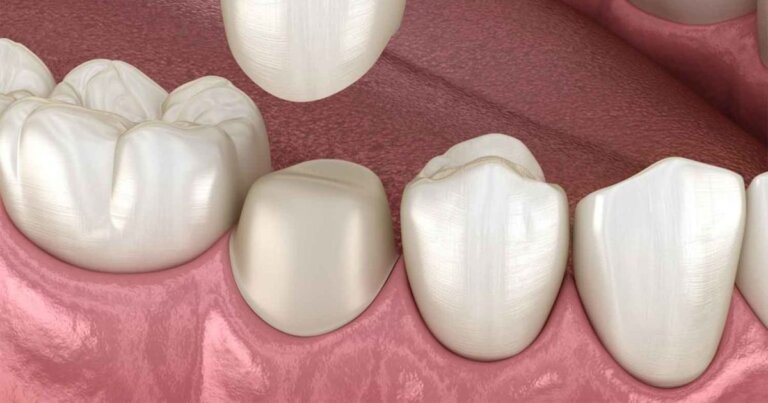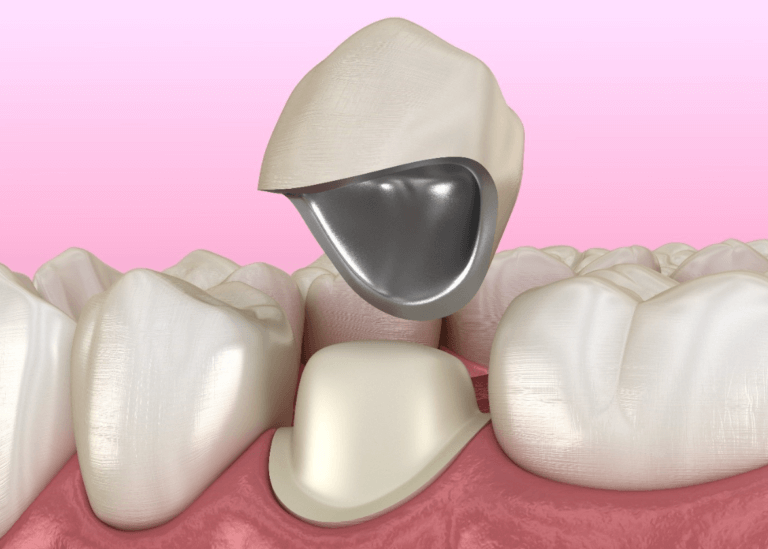Loose Dental Crown

What Is A Loose Dental Crown?
A dental crown is a type of restoration that covers a damaged or decayed tooth to restore its shape, size, and strength. Made from materials like porcelain, ceramic, or metal, dental crowns are designed to last for many years with proper care. However, a crown may sometimes become loose or fall off entirely. If this happens, it can lead to discomfort, sensitivity, and even further damage to the tooth beneath.
Before you contact a Toronto dentist to examine a Loose Dental Crown, there are some things you should know as a patient:
- Why Do I Have A Loose Dental Crown?
- Signs And Symptoms Of A Loose Dental Crown
- Treatment Options For A Loose Dental Crown
- Managing A Loose Dental Crown Until You Can See The Dentist
- Frequently Asked Questions About Loose Dental Crowns
If you have questions about Loose Dental Crown or other dental problems, please contact us for more information.
Why Do I Have A Loose Dental Crown?
A loose dental crown can result from several causes, including:
- Tooth Decay: If the tooth under the crown is affected by decay, it can weaken the bond between the tooth and the crown, causing it to become loose or fall off.
- Trauma or Injury: A blow to the mouth or face can dislodge a dental crown or make it loose.
- Teeth Grinding or Clenching: Excessive grinding or clenching, often during sleep, can put pressure on the crown and lead to it loosening or even breaking.
- Aging Cement: Over time, the cement used to secure the crown may degrade, causing the crown to loosen.
- Poor Oral Hygiene: Neglecting proper oral hygiene can lead to gum disease or other issues that affect the crown’s stability.
It’s important to address a loose dental crown as soon as possible to avoid further damage to the underlying tooth and to prevent the crown from falling out. If you have further questions about a Loose Dental Crown, please contact us.
Signs And Symptoms Of A Loose Dental Crown
If your dental crown is loose, you may experience the following:
- Sensitivity: Pain or discomfort when consuming hot, cold, or sweet foods.
- Wobbliness: A feeling that the crown is loose or moving in your mouth.
- Misaligned Bite: The crown may shift, causing your bite to feel off.
- Discomfort: Pain when biting or chewing food.
- Bad Taste or Odor: Accumulation of bacteria beneath the crown can lead to an unpleasant taste.
- Visible Damage: Cracks or chips in the crown may appear.
Recognizing these symptoms early can help prevent more serious dental issues. If you have further questions about a Loose Dental Crown, please contact us.
Treatment Options For A Loose Dental Crown
The treatment for a loose crown will depend on the severity of the issue. Here are common treatment options:
- Recementing the Crown: If the crown is still in good condition, your dentist may remove it, clean the tooth, apply fresh dental cement, and reattach the crown.
- Crown Replacement: If the crown is damaged or cannot be securely cemented, your dentist may recommend a new crown. This involves removing the loose crown, preparing the tooth, and placing a new one.
- Root Canal Therapy: If the underlying tooth is infected or decayed, your dentist may need to perform a root canal to treat the infection before placing a new crown.
- Tooth Extraction: In severe cases, if the tooth or crown cannot be saved, extraction may be necessary. Your dentist will then discuss replacement options, such as a dental implant or a dental bridge.
The best treatment option for a loose dental crown will depend on the specific circumstances of your case. If you have further questions about treatment options for a Loose Dental Crown, please contact us.

Managing A Loose Dental Crown Until You Can See The Dentist
If you can’t see your dentist immediately, here’s how to manage a loose crown:
- Avoid Hard and Sticky Foods: Refrain from eating anything that requires intense chewing or could get stuck on the crown.
- Practice Good Oral Hygiene: Gently brush and floss around the crown to prevent further issues, and consider using a Waterpik water flosser for better cleanliness around the crown.
- Use Temporary Dental Adhesive: You can use temporary dental adhesive (available at pharmacies) to reattach the crown until you can visit your dentist. However, this is a short-term solution and should not be relied on long-term.
- Pain Management: If you experience discomfort, over-the-counter pain relievers like ibuprofen (Advil) or acetaminophen (Tylenol) can help manage pain. Follow the recommended dosage to avoid any health complications.
Remember, these steps are only temporary. It’s essential to see your dentist as soon as possible to prevent further damage to the tooth or crown. If you have further questions about a Loose Dental Crown, please contact us.
Frequently Asked Questions About Loose Dental Crowns
- Can I fix a loose dental crown myself?
It’s best not to attempt fixing a loose crown yourself. Visit your dentist as soon as possible for professional care.
- How long can I wait before seeing a dentist about my loose dental crown?
You should seek dental attention as soon as possible to prevent further damage or infection to the underlying tooth.
- Can a loose dental crown cause an infection?
Yes, a loose crown can expose the underlying tooth to bacteria, potentially leading to decay or infection if left untreated.
- How can I prevent my dental crown from becoming loose?
Maintain good oral hygiene, avoid hard or sticky foods, and consider wearing a nightguard if you grind your teeth to protect your crown.
For more information on managing a loose dental crown or other dental concerns, contact us at Atlas Dental. Our team is here to help ensure you receive the care you need for a healthy, comfortable smile.

